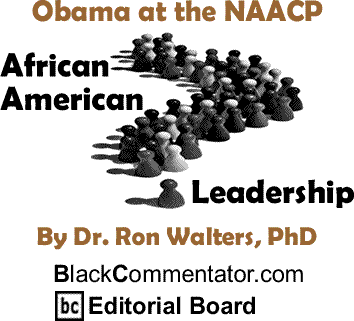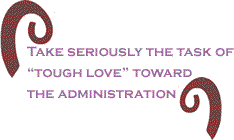
|
||||||||||||||||||||||||

|
|

Custom Search
|
|
 |
|
Well, despite what we hear to be something of a struggle within his administration about how close President Barack Obama should be to the African American community, he showed up at the 100th Anniversary of the NAACP and shouted out. At some points in his speech, I couldn’t tell who Obama was and who Ben Jealous, the new CEO was, as Obama turned country preacher and got busy giving the organization its marching orders.
In that vein, he wants to strengthen community colleges to bear more of the challenge of job training, institute a “race to the top” fund to give learning incentive to children in public schools and pilot programs that feature innovative college preparation. I liked his urging for us to elevate more examples of professional excellence in fields other than athletics and entertainment as the basis for educational achievement.
Nevertheless, while he presented both halves of the balance of responsibility to energize black progress, both government and the black community, the private sector seldom gets included (except by those who discuss Reparations) while it has the largest responsibility as providers of critical resources such as housing, employment and wealth. He could have said more about this in reforming the economy, by sending some of that TARP money to community banks to expand credit for depressed neighborhoods.
The opportunity to have said more about the private sector responsibility was missed, even though Obama’s NAACP speech was given on the very day the Senate was discussing his nomination of Judge Sonia Sotomayor to the Supreme Court and the major highlight of those hearings was the Ricci case, featuring Affirmative Action. Although Obama may have been advised to take a pass because his advisers believed that an errant comment by him could have been damaging to the judge, an NAACP audience still needed to hear that Affirmative Action was not dead, that it is still needed and that his Administration was committed to it. I liked the strategy that Obama laid out which gave the NAACP the role of making the White House do what is right, in other words, being the legitimate protagonist for an agenda of civil and human rights. It strikes me that is the right posture, not just for a black president but for any president, as was discussed during the campaign about his fidelity to the Black Agenda. But being a protagonist at a time when there is a history-making event, such as a popular black man sitting in the White House, takes courage and thus far, little courage has been in evidence by any of the black leadership. Maybe that is because when you attempt to broach the issue of accountability, even by accident, you are disbarred from the black community – ask Rev. Jesse Jackson, Tavis Smiley, and others. Will the NAACP be up to the role of the legitimate protagonist? I don’t know because historically, it has also depended upon access to the White House as a currency of its leadership, and that currency could be eroded by the alienation that naturally comes from strong opposition. So, maybe it is not just a role for the NAACP, but for all of our organizations, to take seriously the task of “tough love” toward the administration, a role that gives strong support when it is right on our issues and strong opposition when the need is clearly there, but nothing happens. What more can anyone ask? BlackCommentator.com
Editorial Board member Dr. Ron Walters is the Distinguished
Leadership Scholar, Director of the African American Leadership
Center and Professor of Government and Politics at the University
of Maryland College Park. His latest book is: The Price of Racial Reconciliation (The Politics of Race and Ethnicity)
|
|
Any BlackCommentator.com article may be re-printed so long as it is re-printed in its entirety and full credit given to the author and www.BlackCommentator.com. If the re-print is on the Internet we additionally request a link back to the original piece on our Website. Your comments are always welcome. eMail re-print notice
If you send us an eMail message we may publish all or part of it, unless you tell us it is not for publication. You may also request that we withhold your name. Thank you very much for your readership. |
|
| |
|
| July
23, 2009 Issue 334 |
|
| Executive Editor: Bill Fletcher, Jr. |
| Managing Editor: Nancy Littlefield |
| Publisher: Peter Gamble |
| Est. April 5, 2002 |
Printer Friendly Version
in resizeable plain
text format or pdf
format. |
 |

|
 |
 |
 |
| |
| |






































